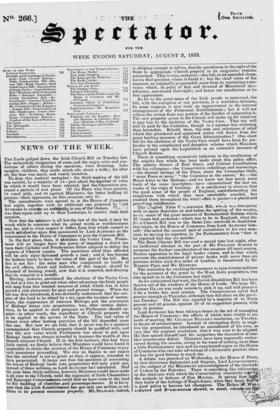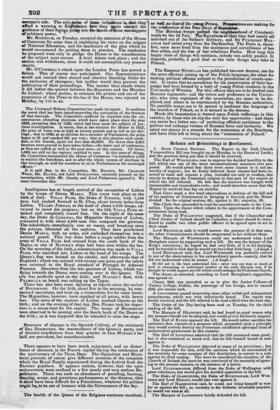NEWS OF THE WEEK.
THE Lords gulped down the Irish Church Bill on Tuesday last. The melancholy resignation of some, and the angry cries and con- tortions of others during the operation, were diverting. Like naughty children, they made much ado about a trifle ; for after all, the dose was small, and nearly tasteless.. To drop this medical metaphor : the third reading of the bill was carried, by a majority of 54—just about the number of votes by which it- would have been rejected, had the Opposition pos- sessed a particle of real pluck. Of the Peers who were present, 70 voted with, and 50 against Ministers; the latter holding 65 proxies—their opponents, on this occasion, only 31. The amendments were agreed to in the House of Commons last night, together with an additional one proposed by Lord AT moan to rem* an amllsigtiity in one of the-elauses. The Lj was then again sent up to their Lordships, to receive their final sanction.
Now that the mbasure is all but the law of the land, it may be worth while to examine what its actual worth or worthlessness may be; and in what respect it differs from that which caused so much satisfaction when first announced by Lord ALTHORP as the inducement to the House of Commons to pass the Coercion Bill.
In the first place, then, it abolishes the Vestry Cess. Protes- tants will no longer have the power of imposing a direct tax 'upon their Catholic and Presbyterian fellow subjects to defray the expense of Church repairs. 'The pecuniary relief thus afforded will be only sixty thousand pounds a year; and it has become the fashion lately to decry the value of this part of the bill. But this is not fair : the tame men who complained so loudly of the evil effects, direct and indirect, of this impost, should be ashamed of turning round, now that it is removed, anti denying that its removal is a benefit.
Having, however, mentioned the abolition of the Vestry Cess, we feel at a loss to point out what other advantage the Irish people will reap from this boasted measure of relief, which was to have proved a rich atonement for past and present wrongs. When the bill was first introduced, it was distinctly understood, that the sur- plus of the fund to be raised by a tax upon the incomes of incum- bents, the suppression of sinecure Bishops, and the conversion of Bishops' leases into perpetuities, was, after certain deduc- tions, to be applied to such purposes as Parliament should ap- point—in other words, the superfluity of Church property was to be applied to the service of the State. The real value of almost every other leading provision of the bill depended upon this one. But now we are told, that it never was for a moment contemplated that Church property should be meddled with, and that the new value which Parliament was about to put upon Bishops' lands was always intended to increase the wealth of this bloated sinecure Church. If, in the first instance, this had been fairly stated, we firmly believe that Ministers would have found it impossible to obtain the sanction of the House of Commons to any such monstrous proceeding. We owe no thanks to our rulers that the mischief is not as great as they, it appears, intended to have perpetrated. It turns out that the operation of converting the leases of Bishops' lands into perpetuities will only yield one, instead of three millions, as Lord AI-THORP had calculated. Had the sum been thirty millions, however, Ministers would have made 'tall over to the Church, until the ingenuity of Irish Chancellors and Episcopal Commissioners could find no more room in the land for the building of churches gnd parsonage-houses. It is fortu- nate that the Irish Establishment .has got only one million in ad- dition to its present enormous property. Mr. STANLEY, indeed, is obliging enough to tell us, that the question as to the right of the State to appropriate Church property to its exigencies remains untouched. That is true, certainly—this bill, in its amended shape, leaves that question where it found it ; but the chief value of the measure, as originally propounded, arose from its containing a pro- vision which, in point of fact and divested of Ministerial mys- tification, sanctioned that right ; and hence our satisfaction on its first appearance. As far as the great mass of the Irish people is concerned, the bill, with the exception of one provision, is a worthless delusion. In some respects it may work an improvement in the internal - arrangements of the Protestant Establishment ; but it will not relieve the nation from any portion of the burden of supporting it.. The new property given to the Church will make up for whatever it may lose by the abolition of the Vestry Cess. That tax will still be paid by the Catholics, though in a manner less irritating than heretofore. Behold, then, the sum and substance of relief- which this plundered and oppressed nation will derive from the great healing measure of the GREY Administration ! One short bill for the abolition of the Vestry Cess would have been far pre- ferable to the complicated and deceptive scheme which Ministers have palmed upon the Legislature as an extensive measure or Church Reform.
There is 'Something excessively ludicrous in the recollection of the mighty fuss which has been made about this paltry affair. The solemn threats of Earl GREY, and Cabinet consultations with his colleagues—the Conservative caballings and musterings —the diurnal ravings of the Press, about the Coronation Oath, "snore Peers or none," "the Commons to the rescue," &c.—the Royal letter to the Bishops—and we know not how much more trash of the same description—have immortalized the last six weeks of the reign of humbug. It is satisfactory to observe, that the good sense of the people of England, notwithstanding the . stimulants with which they were -constantly assailed, has enabled them throughout thb whole affair to preserve a placid and provoking indifference. . The.',Ienglish Tithe C Aeruutatein Bill, wes trumpeted. with so- many flourishes at and before the opening of the session, as on: share of the great measure of Ecclesiastical Reform. which Miristers had perfected—which was to be to England, what the Iri,h Church Bill was to the Sister Isle—received its deathblow • last night, in the House of Commons, from Lord .ALTHORP him- self; who acted the unusual part of executioner to his own mea- sure, by moving its-rejection, in the Parliamentary form "that it be reported that day six months." The Bank Charter Bill was read a second time last night, after an ineffe.ctual attempt on the part of Mr. PouLErr SCRGPE to postpone the further consideration of the measure till next session. ' Serious opposition to the legal tender clause, and to that which prevents the establishment of private banks with more than six partners within sixty-five miles of London, is threatened by Sir ROBERT PEEL and MT. HERRIES.
The resolution for enabling Government to raise twenty millions for the payment of the grant to the West India proprietors, was also agreed to in the Commons last night. As we anticipated last week, the Jewish Disabilities Bill has been thrown out of the windows of the House of Lords. We hope Mr.
ROBERT GRANT was ready outside to pick it up, and will preserve • it for a better fate next session. The Conservatives could find proxies enough on Thursday, although they fell short on the previ- ous Tuesday. The Bill was rejected by a majority of 44 Peers present and 60 proxies, against 29 of its supporters present, with only 25 proxies. Lord ALTHORP has been taking a lesson in the art of managing the House of Commons ; the effects of which were visible in his mode of meeting Mr. CHARLES BULLER'S resolution, on Tuesday, in favour of retrenchment. Instead of attempting flatly to nega- tive the proposition, he introduced an amendment of his own, so very like the original resolution, that it was sure to be adopted. He thus spared himself and his supporters the discomfort of ano- ther unnecessary defeat. Ministers have been repeatedly embar- rassed during the session, owing to the want of nothing more than a little Parliamentary tact, and an experienced organ in the House of Commons who can take advantage of a favourable position when he has the good fortune to reach one. A debate was provoked on Wednesday, in the House of Peers, by that illustrious diplomatist and dragoon, Lord LONDONDERRY, on the subject of the Ministerial acknowledgment of the blockade of Lisbon by the Pedroites. There is something like infatua 'tan in the obstinacy with which the Conservatives constantly tale+ the cudgels in defence of Don MIGUEL. It proves hts'1iØTe• they know of the feelings of Englishmen, when they fancy tha is good policy to become his champions The Dukes .4,144: LINGTON and BnCILINGRAM showed, as usual, coouotk
usurper's side. The only,,satle of these indiaitions is that they afford a warning to Eniiiihmen hew they again commit the guidance of their fokvign poliq into the bands ofthese worshippers of arbitrary power. • Mr. ROEBUCK, on Tuesday, occupied the attention of the House of Commons for some time in explaining his views on the subject of National Education, and the machinery of the plan which he would recommend for putting them in practice. The resolution he proposed went only to pledge the House to the consideration of the subject next session. A brief debate took place ; and the motion was withdrawn, since it could not accomplish any present results.
Mr. O'CoNstELL's attack upon the London Press has proved a failure. This of course was anticipated. Our Representatives would not rescind their absurd and abortive Standing Order for the exclusion of strangers • but neither would they prevent the publication of their proceedings. The matter then stands where it did before the quarrel between the Reporters and the Member for Ireland ; whose motion, to summon the printer and one of the proprietors of the Times to the bar of the House, was rejected on Monday, by 153 to 48.



















 Previous page
Previous page